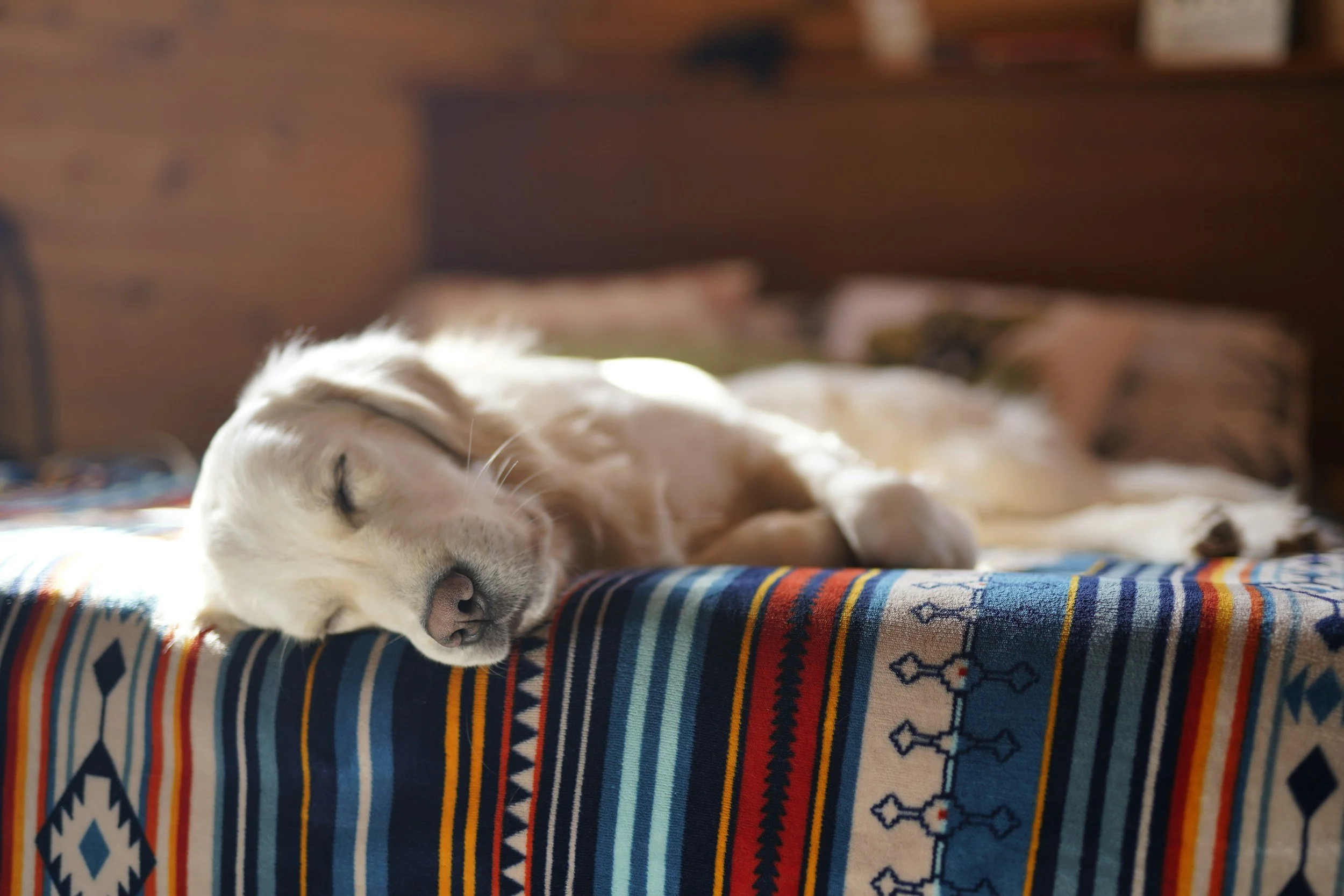The Importance of Sleep and How to Improve It for Your Dog
Sleep is essential for dogs, just as it is for humans. A good night’s rest helps your pup recover, recharge, and stay healthy. Yet, many dogs struggle with poor sleep quality, which can impact their physical and emotional well-being.
“Sleep plays a vital role in your dog’s overall health,” says Denise Bozenski, certified holistic pet health coach and owner of Fetch This Canine. “From boosting immunity to improving mood, sleep is the foundation of a happy, healthy dog.”
Learn more about Denise HERE!
Why Sleep Matters for Dogs
Dogs need varying amounts of sleep depending on their age, breed, and activity level. Puppies and senior dogs may sleep up to 20 hours a day, while adult dogs generally rest for 12-14 hours. Sleep is crucial for:
- Physical Recovery: Sleep allows muscles to repair and grow, especially after exercise.
- Emotional Health: A well-rested dog is less likely to exhibit stress or anxiety.
- Immune Function: Adequate rest strengthens the immune system, helping to ward off illness.
“Without proper sleep, dogs can become irritable, lethargic, or even prone to behavioral issues,” Denise explains.
Causes of Poor Sleep in Dogs
Many factors can disrupt your dog’s sleep, including:
- Discomfort: An old, lumpy bed or joint pain can make it hard for dogs to settle down. Learn more about addressing joint discomfort in the blog Holistically Support Your Dog's Joint Health.
- Anxiety: Stress from separation, loud noises, or changes in routine can lead to restlessness.
- Diet: Poor nutrition or eating too close to bedtime can disrupt sleep.
- Environment: Noise, temperature, or lighting in your dog’s sleeping area can affect rest quality.
How to Improve Your Dog’s Sleep
Provide a Comfortable Sleeping Area
Ensure your dog has a cozy, supportive bed. Orthopedic beds can be beneficial for senior dogs or those with joint issues.
“A proper bed isn’t a luxury; it’s a necessity,” Denise emphasizes.
For more information on creating a cozy sleeping spot, check out Creating a Safe and Comfortable Sleeping Area For Pets.
Establish a Routine
Dogs thrive on routine. Create consistent sleeping and waking times to help regulate their internal clock.
“Just like humans, dogs feel more secure with predictable schedules,” Denise explains.
For advice on creating a holistic pet care routine, read here Create a Holistic Pet Care Routine.
Exercise Regularly
Daily physical activity helps your dog expend energy, making it easier for them to relax at night.
“Exercise doesn’t just tire them out physically—it also provides mental stimulation, which is key for restful sleep,” says Denise.
Read here for more information on the importance of exercise The Importance of Regular Exercise For Pets.
Address Anxiety Holistically
Natural remedies like aromatherapy or calming supplements can help reduce anxiety.
“Reducing stress is one of the most effective ways to improve your dog’s sleep,” Denise notes.
Optimize Their Diet
Feeding your dog a nutrient-dense, balanced diet can support better sleep. Avoid feeding large meals too close to bedtime. Learn more about holistic diets in the blog The Benefits of a Raw Diet.
Holistic Tips for Better Sleep
Sleep is a cornerstone of your dog’s health. By creating a comfortable environment, addressing stress, and prioritizing nutrition, you can ensure your furry friend gets the rest they need to thrive. Additional holistic strategies include:
- Massage and Acupressure: These can relax tense muscles and calm your dog before bedtime.
- Herbal Support: Chamomile and valerian root are gentle herbs that can promote relaxation.
- Environment Control: Create a quiet, dark, and cool sleeping space.
“Sometimes, small changes can make a big difference in your dog’s sleep quality,” Denise says. “A well-rested dog is a happy, healthy dog,” Denise concludes. For more information on living a holistic lifestyle with your dog, visit Fetch This Canine.
Frequently Asked Questions
How much sleep does my dog need?
Most adult dogs need 12-14 hours of sleep per day, while puppies and seniors may need up to 20 hours.
What can I do if my dog seems restless at night?
Address potential discomfort, ensure your dog gets enough exercise, and consider calming remedies like massage or aromatherapy.
Are sleep issues a sign of a health problem?
Yes, sleep disturbances can indicate underlying issues like pain, anxiety, or illness. Consult your vet if poor sleep persists.
To stay up on the latest expert advice for all things holistic dog wellness and care, subscribe to our newsletter.


